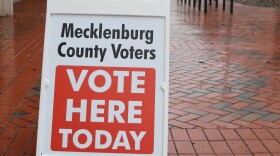Karen Brinson Bell knows what it costs to inform voters of changes to the law requiring photo identification at the polls and to cast mail-in ballots.
"Several million dollars designated for voter education," Brinson Bell said, remembering what the North Carolina State Board of Elections got from lawmakers to make sure voters knew the rules ahead of the March 2016 primaries.
You cannot claim to care about conducting fair and safe elections and then undercut the board's ability to function.N.C. Sen. Natasha Marcus, D-Mecklenburg

Brinson Bell is the election board's executive director.
The 2016 primaries were the last, and only, time photo ID was required to vote in North Carolina. Eventually, however, a federal court ruled that Republican-drafted photo ID law and related legislation was unconstitutionally discriminatory and had targeted Black voters with "almost surgical precision."
Then, in 2018, a new round of litigation started over a new mostly GOP-backed photo ID law, ending in the same result. The law was declared unconstitutional for its potentially disparate impact on Black voters — a ruling upheld by the state Supreme Court last year when a majority of justices were Democrats.
Then, this past April, the state Supreme Court, now with a Republican majority, reversed that decision — and once again, elections officials must educate voters about what they'll need to cast ballots in person or by mail — but without a lot of time or enough money to do it adequately.
"The House allocated only about half of what the state board needs to implement voter ID, the Senate's proposal offers no extra money for this purpose and, in fact, cuts two staff members at the board of elections," said state Sen. Natasha Marcus, a Democrat representing Mecklenburg County.
Marcus joined other Democrats at a news conference last week to slam an omnibus elections bill recently filed by Republicans. She and her colleagues argued that while Republicans are pushing for radical changes around voter registration and mail-in ballots, they are not drawing up budgets that would enable elections officials to adequately inform voters of the changes.
"You cannot claim to care about conducting fair and safe elections and then undercut the board's ability to function," Marcus declared.State elections officials need $6.5 million over two years to inform voters about photo ID requirements
Absentee ballots go out on August 11 for this year's municipal elections and must contain the proper instructions for submitting an acceptable photo ID.
Karen Brinson Bell said her agency wants lawmakers to appropriate $6.5 million over two years in the next biennial budget for things like consulting an ad agency and considering billboards to get the word out about photo ID.
"Can we do some professional recordings for some PSAs on the radios or TV spots so we can inform voters?" Brinson Bell asked rhetorically, giving an idea of how such funds would be used.
Conferees from each legislative chamber are negotiating over a final budget plan now, but an early House version allocated just $3.5 million for one year, and the Senate plan had nothing.
"There have to be software changes, there have to be printing changes, forms and envelopes, and so forth," Brinson Bell said.
But printing new envelopes and educating voters on new rules for photo ID and absentee ballots is only part of what the elections boards has to do.
NC's election information management system needs modernizing
An even bigger issue, according to Brinson Bell, is the board's outdated State Election Information Management System, or SEIMS. Brinson Bell called it the "brains" of North Carolina's elections administration system. Among its many functions, it's used by poll workers to check in voters and by elections staff to update voter registration records.
"The way that we process their absentee-by-mail requests and then ensure that we don't have, you know, people being able to vote more than once," Brinson Bell explained, "that's this system!"
SEIMS ties the state's election system together but it was developed in the 90s.
"I have often said that it looks more like Atari than anything that you're accustomed to seeing on your smartphone today," said Brinson Bell.
The elections board has asked lawmakers for a $13 million capital investment to overhaul SEIMS and the state's campaign finance reporting system. But at this point, GOP budget writers do not seem inclined to give the elections board what it needs.

Brinson Bell said the House would allocate around $5.5 million for modernizing SEIMS.
"But the senate has not authorized any funding for that," she added.
Brinson Bell said that failing to adequately fund system upgrades, voter education, and positions for critical personnel is not a recipe for success when it comes to managing elections.
"It's asking people to work overtime, that's when errors happen," she cautioned. "It's asking people, when you're already short-staffed and short-funded, to do more with less."
GOP-backed law would ban the use of grants from private foundations for elections administration
State Sen. Paul Newton, a Republican from Cabarrus County and co-chair of the Redistricting and Elections Committee, said if the elections board needs additional resources, he believes lawmakers and appropriations chairs will take that seriously.
"But if she'd love to talk about reducing taxes, she should give me a call because I chair finance, not appropriations," Newton said in a humorous tone, referring to communication with Brinson Bell.
"But we're not going to let that go unaddressed one way or the other," Newton added, about the urgent funding needs of the elections board.
Meanwhile, the GOP-backed omnibus elections bill sets out to ban the use of donations from private foundations for elections administration. During the pandemic, when elections officials across the country needed extra money to equip polling places with protective equipment and sanitizer, foundations established by people like Arnold Schwarzenegger and Mark Zuckerberg stepped in to help.
Republicans and conspiracy theorists have seized on these types of donations as an indication of liberal attempts to undermine election integrity.
But as Karen Brinson Bell said, "pens are not partisan."
"We got six million pens so that voters did not have to spread germs, so that our workers did not have to sanitize when they could be helping voters cast their ballots," Brinson Bell said.
In 2020, private grant money went to providing bonuses for poll workers who staffed one-stop sites during the 17-day early voting period and to purchase more personal protective equipment.
Still, Brinson Bell said private funds are not the answer to funding critical infrastructure like elections administration — the answer is more and consistent public funding.
"North Carolina needs the investment by our own state in how we administer elections," she said, adding that she hopes lawmakers recognize that as they work on the new two-year budget.
Hopes aside, Brinson Bell's days as the state's top elections administrator may be numbered.
This week Republicans unveiled a bill that would reconstitute the elections board, making it an eight-member body appointed entirely by lawmakers from both parties with no gubernatorial appointees.
And if the even-numbered board deadlocks, decisions on appointing a chairperson or executive director would go to the legislature.








